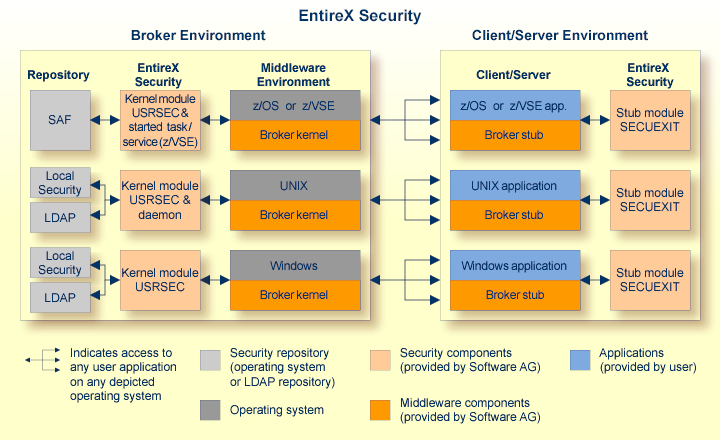This document introduces EntireX Security under UNIX through overviews of the functionality and components of EntireX Security. The location where Broker Kernel is installed determines the functionality made available for EntireX Security.
This document covers the following topics:
Note:
Setting up EntireX Security is described under Setting up EntireX Security under UNIX.
This table lists the security functionality available with EntireX Security running Broker Kernel under the respective operating system.
| Security Functionality | z/OS | UNIX | Windows | BS2000 | z/VSE | Comment |
|---|---|---|---|---|---|---|
| Authentication of user | Yes | Yes | Yes | Yes | Yes | Verify User ID password. |
| User password change | Yes | No | No | No | No | |
| LDAP authentication | No | Yes | Yes | No | No | Authenticate using LDAP repository. |
| Trusted user ID | Yes | No | No | No | No | Trusted computer base, avoiding plain text password. |
| Verified client user ID | Yes | No | No | Yes | Yes | Provide verified identity of client to server. |
| Authorization of client request | Yes | No | No | No | No | |
| Authorization of server register | Yes | No | No | No | No | |
| Authorize IP connection | Yes | No | No | No | No | |
| Authorization rules | No | Yes | Yes | No | No | An authorization rule is used to perform access checks for authenticated user IDs against lists of services defined within the rule. This feature is available on UNIX and Windows using EntireX Security on these platforms. Authorization rules can be stored in the Broker attribute file or in an LDAP repository. See Authorization Rules. |
| SSL/TLS | (1) | Yes | Yes | No | (2) | Industry standard encryption mechanism. See SSL/TLS and Certificates with EntireX. |
Notes:
This diagram depicts the location where the broker kernel must be installed and where the broker stubs can be installed. It also depicts the location of the security components of the kernel and stubs of broker.
